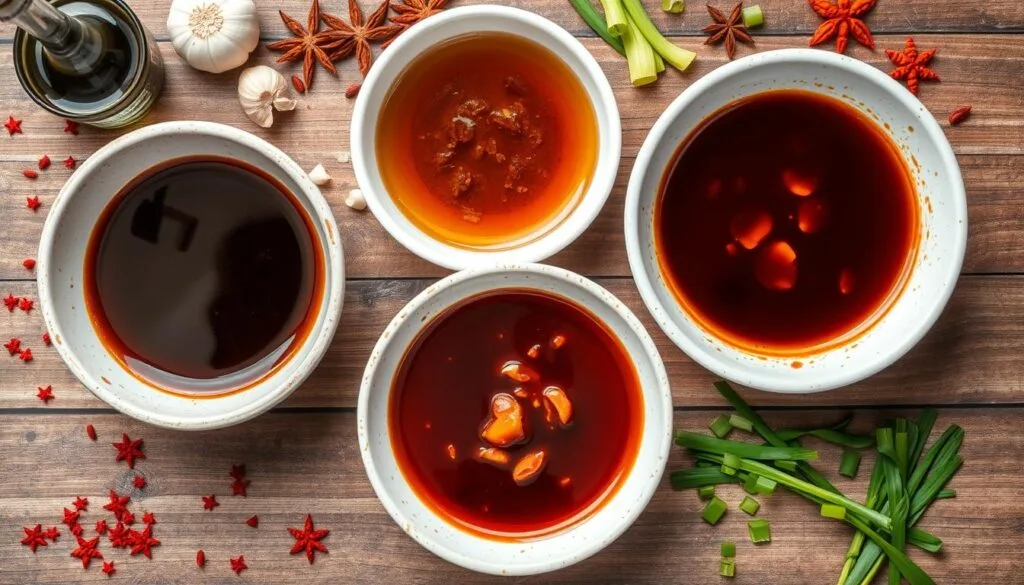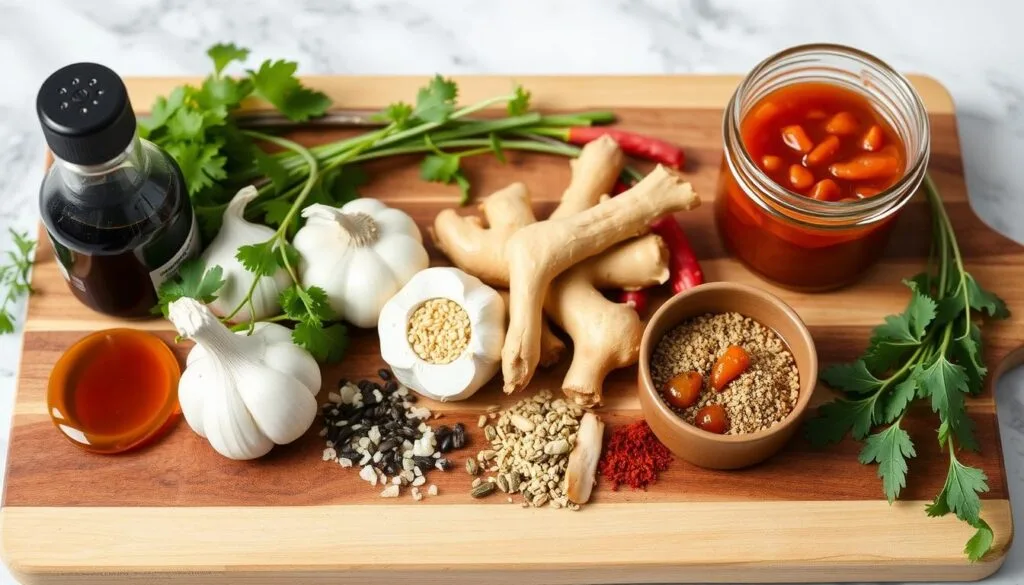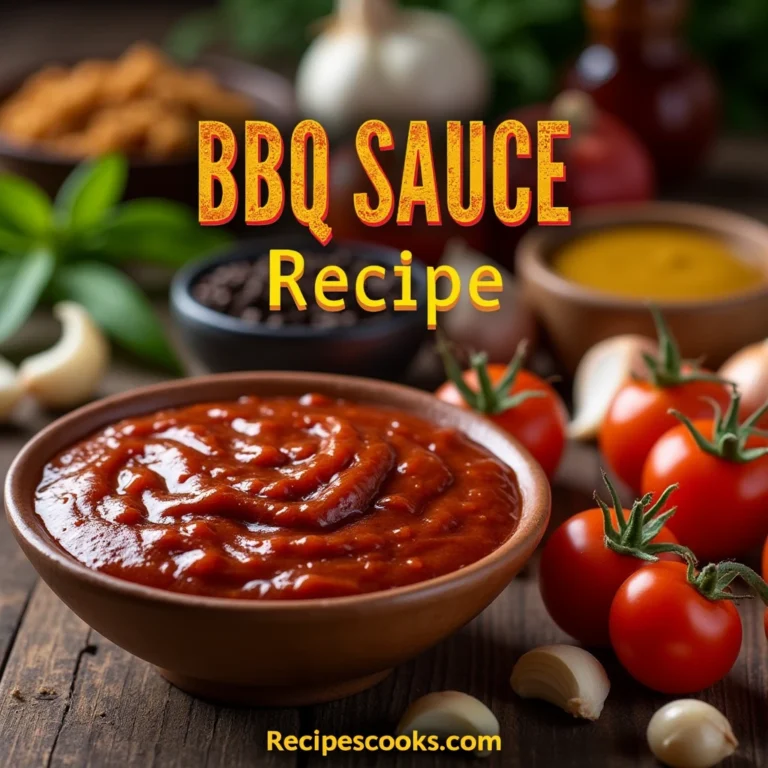Korean BBQ Sauce: 7 Insanely Easy Homemade Versions
The first time I tasted authentic Korean BBQ sauce, my cooking world changed. The mix of sweet, spicy, and savory flavors was amazing. It made me love learning about this sauce.
Korean BBQ sauce is more than a simple marinade. It’s a way to bring traditional Korean tastes into your kitchen. Unlike American BBQ sauce, it has a special mix of ingredients. This makes your bulgogi marinade truly special.
Imagine making a sauce in just 10 minutes that makes any protein taste like a restaurant dish. Korean BBQ sauce lets you create a dish that connects you to centuries of cooking traditions.
This guide will teach you everything about making the perfect Korean BBQ sauce. You’ll learn about its key ingredients and how to prepare it. Soon, you’ll be making top-notch marinades at home.
Whether you’re an experienced cook or just starting, making authentic Korean BBQ sauce is easy. Get ready to discover a world of flavors that will change your cooking forever.
Table of Contents
Understanding Korean BBQ Sauce Fundamentals
Korean BBQ sauce is a true culinary masterpiece. It turns simple meals into unforgettable experiences. Unlike American BBQ sauces, it offers a unique flavor mix that excites your taste buds.
Distinctive Flavor Characteristics
Korean BBQ sauce is known for its complex flavors. Soy sauce is at its core, giving it a rich umami taste. This sets it apart from American BBQ sauces based on tomatoes.
The sauce also has:
- Deep umami from fermented ingredients
- Sweet undertones from honey or brown sugar
- Spicy hints from gochujang paste
- Aromatic complexity from garlic and ginger
Core Ingredient Breakdown
| Ingredient | Flavor Contribution | Sodium Content |
|---|---|---|
| Soy Sauce | Umami base | 670 mg per serving |
| Gochujang Paste | Spicy complexity | Varies by brand |
| Brown Sugar | Natural sweetness | Low sodium |
Flavor Profile Components
The magic of Korean BBQ sauce is in its balanced flavors. Gochujang paste adds a spicy warmth. Soy sauce brings depth and saltiness. Together, they make a sauce that’s sweet, spicy, and savory.
Korean BBQ sauce is not just a condiment, but a culinary journey that transforms simple ingredients into a flavor explosion.
Essential Ingredients for Authentic Korean BBQ Sauce
Making authentic Korean BBQ sauce needs the right ingredients. These ingredients add depth and complexity to your dishes. They turn simple meals into amazing ones.
The key ingredients for Korean BBQ sauce are:
- Soy sauce (primary base)
- Sesame oil for rich, nutty undertones
- Rice vinegar for balanced acidity
- Brown sugar to add sweetness
- Fresh garlic and ginger
- Asian pear for natural tenderizing
“The magic of Korean BBQ sauce is in its perfectly balanced ingredients” – Korean Culinary Experts
Sesame oil is key to the sauce’s flavor. Just 2 teaspoons can make a big difference. Rice vinegar adds a tangy touch, while brown sugar gives a sweet caramel flavor.
Choose high-quality ingredients for the best taste. Use fresh garlic, grated ginger, and top-notch soy sauce. These will make your sauce stand out.
| Ingredient | Quantity | Purpose |
|---|---|---|
| Soy Sauce | ⅓ cup | Primary flavor base |
| Sesame Oil | 2 teaspoons | Nutty depth |
| Rice Vinegar | 1½ tablespoons | Acidity balance |
| Brown Sugar | 2-3 tablespoons | Sweetness |
Pro tip: Play with the ratios to get your ideal mix. Homemade Korean BBQ sauce is all about finding what you like best.
The Perfect Base: Choosing Your Soy Sauce and Aromatics
Making a true Korean BBQ sauce begins with picking the right soy sauce and aromatics. These ingredients are key to your sauce’s taste and depth. Knowing their differences is crucial for great cooking.
Navigating Soy Sauce Varieties
Choosing the right soy sauce is important for Korean BBQ sauce. There are three main types that can make your sauce better:
- Light Soy Sauce: It adds a bright, salty taste that’s great for marinades
- Dark Soy Sauce: It gives a rich color and a hint of sweetness
- Tamari Soy Sauce: It has a deeper, more complex umami flavor
Fresh Aromatics: The Flavor Powerhouse
Fresh ingredients are essential for authentic Korean BBQ sauce. Ginger, garlic, and scallions are the key trio that makes your sauce stand out. Using fresh garlic and ginger gives a more lively taste than pre-made mixes.
“The secret to an exceptional Korean BBQ sauce lies in using fresh, high-quality aromatics.” – Korean Culinary Experts
Asian Pear: Nature’s Secret Weapon
Asian pear is a natural tenderizer and sweetener in Korean BBQ sauce. If you can’t find Asian pear, you can use:
- Bosc pear
- Anjou pear
- Apple (grated)
By picking the right soy sauce and aromatics, you’ll make a Korean BBQ sauce that’s full of authentic flavors. It will turn your dishes into true culinary works of art.
Sweeteners and Seasonings in Korean BBQ Sauce
Making the perfect Korean BBQ sauce is all about finding the right mix of flavors. Sweeteners are key in creating this unique taste. Brown sugar is a standout, adding depth and richness that makes the sauce special.
When picking sweeteners for your Korean BBQ sauce, you have many great choices:
- Brown sugar: Offers rich caramel notes and deep sweetness
- Honey: Provides natural sweetness with floral undertones
- Asian pear puree: Adds subtle fruity sweetness
- Corn syrup: Creates smooth, consistent texture
The secret to a great sauce is balancing brown sugar with other seasonings. You’ll need about 1/4 cup of brown sugar per batch. This helps balance out the saltiness of soy sauce, creating a perfect flavor.
“Sweetness is the secret weapon in Korean BBQ sauce that elevates it from good to unforgettable.” – Korean Culinary Expert
A typical serving of the sauce has about 9g of sugar. This comes mainly from brown sugar and other natural sweeteners. This careful balance ensures the sauce is flavorful but not too sweet.
Try different amounts of brown sugar to find your perfect sweetness level. Start with the recommended amount and adjust to taste. This way, you can make a Korean BBQ sauce that will wow everyone.
Step-by-Step Korean BBQ Sauce Recipe
Making your own korean bbq sauce at home is simple. Just a few ingredients and basic cooking skills are needed. You can turn simple meals into amazing dishes with this sauce.
Preparation Methods
First, collect all your ingredients for a smooth cooking process. For authentic korean bbq sauce, you’ll need:
- 1/4 cup low-sodium soy sauce
- 3 tablespoons maple syrup
- 2 teaspoons sesame oil
- 3 minced garlic cloves
- 2 teaspoons fresh ginger
- 2 tablespoons gochujang paste
- 1 tablespoon rice vinegar
- 1 tablespoon cornstarch
Cooking Instructions
Here’s how to make your perfect korean bbq sauce:
- Put all liquid ingredients in a saucepan
- Whisk in minced garlic and ginger
- Heat the mixture over medium heat
- Let it simmer for 5-8 minutes to dissolve the maple syrup
- Mix cornstarch with water to make a slurry
- Add the slurry to thicken the sauce (2-3 minutes)
Storage Tips
| Storage Method | Duration | Recommended Container |
|---|---|---|
| Refrigerator | Up to 2 weeks | Airtight glass jar |
| Freezer | Up to 3 months | Sealed freezer-safe container |
Pro tip: Always let the sauce cool completely before storing to maintain its rich flavor profile.
“The secret to great korean bbq sauce is balancing sweet, savory, and spicy elements.” – Korean Culinary Expert
Mastering the Perfect Sauce Consistency

Creating the perfect bulgogi marinade is all about the sauce’s consistency. The right texture can elevate your Korean BBQ. You’ll need different viscosities for marinades and glazes.
Thickening agents are key for the right marinade consistency. Cornstarch and potato starch are great for thickening. They turn a thin sauce into a rich, clingy one that coats meat well.
Consistency Tips for Bulgogi Marinade
- For marinades: Keep the sauce thin to penetrate meat easily
- For glazes: Aim for a thicker, more syrupy texture
- For dipping sauces: Create a medium-thick consistency
| Sauce Type | Desired Consistency | Thickening Method |
|---|---|---|
| Marinade | Thin, water-like | No thickening needed |
| Glaze | Thick, coat-like | Cornstarch slurry |
| Dipping Sauce | Medium thickness | Reduced simmering |
Pro tip: When thickening your bulgogi marinade, mix cornstarch with cold water first. This prevents lumps. Then, add the slurry slowly while stirring to get the right texture.
“The secret to a great Korean BBQ sauce is in its consistency” – Korean Culinary Experts
Remember, practice makes perfect. Try small batches to see how ingredients and techniques change the sauce’s thickness. Your taste buds will appreciate it!
Creative Ways to Use Korean BBQ Sauce
Korean BBQ sauce is a versatile ingredient that can make any dish special. It’s not just for Korean barbecue. It lets home cooks get creative and improve their cooking.
Marinades That Pack a Punch
Use your homemade Korean BBQ sauce as a marinade for different proteins. Here are some tasty options:
- Chicken breasts
- Pork tenderloin
- Tofu cubes
- Salmon fillets
Marinate meats for 30 minutes to overnight. This will add deep, complex flavors. Use about 1/2 cup of sauce per pound of protein.
Dipping Sauce Delights
Turn your Korean BBQ sauce into a versatile condiment. It’s great for:
- Vegetable spring rolls
- Grilled shrimp skewers
- Roasted vegetable platters
- Crispy chicken wings
Fusion Cooking Adventures
Be creative with Korean BBQ sauce in unexpected dishes. Try these fusion ideas:
- Korean BBQ pizza with caramelized onions
- Tacos featuring Korean-style pulled pork
- Stir-fried rice with a Korean BBQ glaze
- Grilled cheese sandwiches with a Korean twist
Keep your Korean BBQ sauce in the fridge and use it within a week for the best flavor. This sauce is a mix of sweet, savory, and spicy. It’s your secret kitchen tool.
“A great sauce can transform a simple meal into a culinary adventure.” – Korean Cooking Enthusiast
| Dish Type | Recommended Sauce Amount | Suggested Marinating Time |
|---|---|---|
| Chicken | 1/2 cup per pound | 30 minutes – 4 hours |
| Pork | 1/2 cup per pound | 1-8 hours |
| Tofu | 1/3 cup per block | 15-30 minutes |
| Seafood | 1/4 cup per pound | 15-30 minutes |
Common Mistakes to Avoid When Making Korean BBQ Sauce

Making the perfect Korean BBQ sauce can be challenging. Many struggle with balancing flavors, especially with strong ingredients like gochujang paste and sesame oil. Knowing these common mistakes can help you make a great sauce.
Here are some common errors to watch out for:
- Using too much gochujang paste, which can overpower other flavors
- Adding too much sesame oil, making the sauce too greasy
- Not balancing sweet, spicy, and umami flavors well
- Not tasting and adjusting the sauce while you make it
Getting the right mix of ingredients is key. Gochujang paste should be used sparingly, about 1-2 tablespoons per cup of sauce. Use sesame oil in small amounts, 1-2 teaspoons, to add depth without overpowering the taste.
“Precision is the secret to an exceptional Korean BBQ sauce.” – Korean Culinary Expert
When applying your sauce, timing and temperature matter. Add most BBQ sauces 5-10 minutes before finishing to avoid burning and keep flavors good. Marinate for less than 1 hour to keep the meat’s taste and texture.
Pro tip: Always taste and adjust your sauce before applying it. A great Korean BBQ sauce should have a mix of sweet, spicy, and savory flavors. Gochujang paste and sesame oil should enhance, not dominate, the taste.
Dietary Modifications and Substitutions
Making Korean BBQ sauce for different diets doesn’t mean losing flavor. You can manage gluten, watch sodium, or try new ingredients. This way, you can still enjoy great taste.
Gluten-Free Options
For gluten-free diets, use tamari instead of soy sauce. Tamari has a rich umami taste like soy sauce but is gluten-free. Always check the label to make sure it’s gluten-free.
Sodium Reduction Strategies
For those watching sodium, try low-sodium soy sauce. Regular soy sauce has about 2,247 mg of sodium per serving. Low-sodium versions can greatly reduce sodium intake.
- Replace traditional soy sauce with low-sodium alternatives
- Use rice vinegar sparingly to control sodium levels
- Consider diluting soy sauce with water to reduce salt content
Ingredient Substitutions
Being flexible is important when making Korean BBQ sauce. You can swap rice vinegar for apple cider vinegar for a tangy taste. For specific diets, try these alternatives:
- Coconut aminos as a soy sauce replacement
- Apple cider vinegar instead of rice vinegar
- Maple syrup or honey as alternative sweeteners
“Cooking is about adaptation and creativity. Your dietary needs should never limit your culinary adventures.” – Korean Cuisine Expert
Remember, each swap might change the sauce’s taste a bit. Experiment and adjust to find your perfect mix while keeping your diet in mind.
Conclusion
Making your own Korean BBQ sauce can turn simple meals into amazing dishes. You now know how to balance flavors and techniques. This lets you create a sauce that’s as good as what you find in restaurants.
Creating your own sauce gives you big advantages. You can control what goes into it, like salt and preservatives. You can also make it spicier or sweeter. It’s perfect for marinating meats, dipping, or trying new recipes.
When you get good at making Korean BBQ sauce, you can be really creative. Start with a basic recipe and then try new things. Change up the soy sauce, sweetness, or add special spices. Each batch is a chance to get better and make your own unique sauce.
We encourage you to explore Korean BBQ sauce with excitement. Share your sauces with others, write about your experiments, and most of all, enjoy making them. Your kitchen is ready to make simple ingredients into something special.







